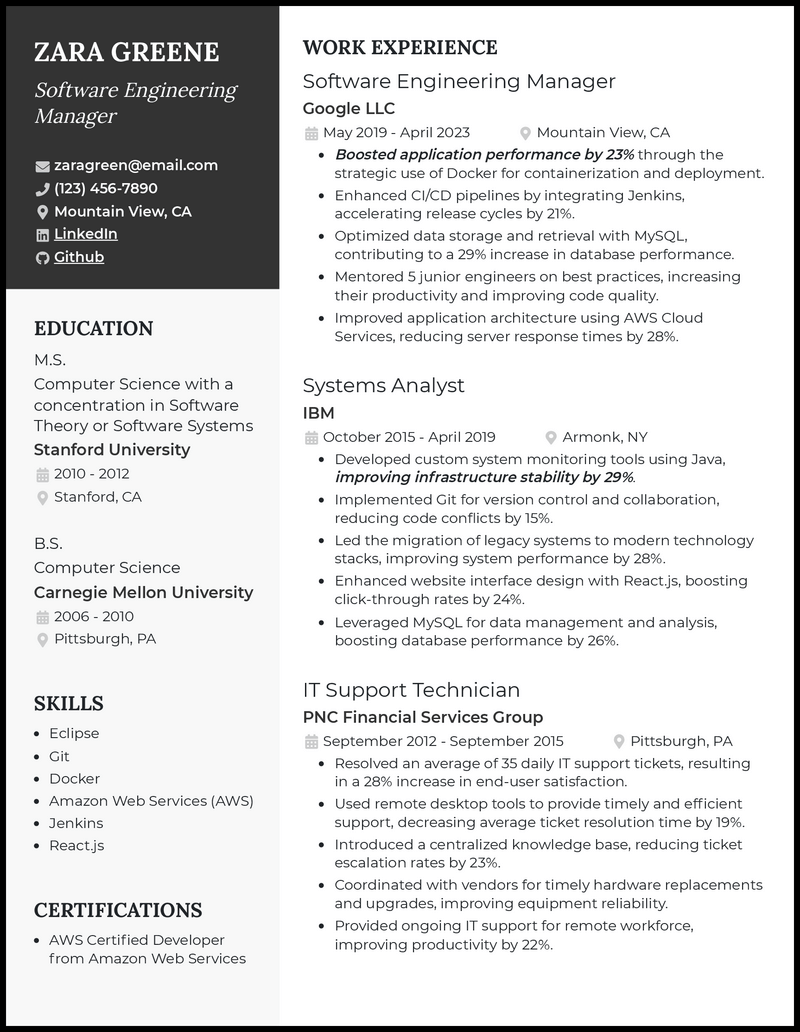You excel in creating innovative software solutions while efficiently running a team. You’ve led many projects all the way from conception to completion, staying within budget and adhering to tight deadlines.
Seeing as part of your job involves liaising with various stakeholders, you’re no stranger to explaining complex concepts to a non-technical audience. However, expressing why employers should hire you is trickier.
We’ve got you covered! With our software engineering manager resume templates, all your skills will be put front and center, and our resume tips will help you pick the best ones to highlight.
Why this resume works
- There are two words that can easily take any software engineering manager resume from 0 to 100. These are “Stanford University.”
- With an acceptance rate of less than 4%, you’ll be a standout candidate from the rest by simply adding it to your education space. This will be good enough to make any manager prioritize your application over everyone else.
What Matters Most: Your Software Engineering Skills & Management Experience

As a software engineering manager, you’ve got more skills than you can fit into a single-page resume. That’s a pretty neat problem to have, but it also makes it all the more crucial to choose wisely when you fill out this section.
While managerial skills are important, recruiters will be looking for your technical skills first and foremost.
List the programming languages and frameworks you’re a pro at, such as Python, C++, or Django. Don’t neglect to mention the rest of your toolkit and the software you use on a daily basis, be it Jira or Postman.
You can address your leadership here by talking about the methodologies you use when leading teams, such as Scrum or Agile.
9 most popular software engineering manager skills
- Coding Languages
- Jira
- GitHub
- Agile
- DevOps Processes
- Docker
- Visual Studio Code
- Jenkins
- Scrum
Sample software engineering manager work experience bullet points
You’ve got plenty to brag about in the “work experience” part of your resume, so here’s how to make the most of it.
Highlight your skills as a software engineer by talking about applications you’ve deployed, designed, or modernized, and include concrete examples of them. To emphasize your leadership, shift gears to talking about the teams you’ve led and their successes.
The best way to show impact, be it your own or that of your team, is to pair your achievements with quantifiable metrics. For example, showcase how you and your engineers stayed within a $100,000 budget while developing a fully-functional web app according to the client’s specifications.
Adding data to your experience helps recruiters visualize the impact of your work, and that’s just one step away from an interview!
Here are a few samples:
- Boosted application performance by 23% through the strategic use of Docker for containerization and deployment
- Enhanced CI/CD pipelines by integrating Jenkins, accelerating release cycles by 21%
- Managed a $2M yearly software development budget across a team of 24 Java and Python developers, deploying back-end code solutions for major stakeholders
- Spearheaded the transition to Agile methodology in a team of 12 engineers, increasing product delivery rate by 26%
Top 5 Tips for Your Senior Engineering Manager Resume
- Put your team in the spotlight
- If you’ve previously worked in a software engineer manager role, make sure to emphasize that throughout your resume. Talk about the size of the teams you’ve led, their specialties, and most of all, the software you were able to deliver as a group of engineers.
- Show your technical leadership
- Many people say that software engineering is not just a job but also a lifestyle, so this is a good thing to highlight in your resume. Showcase your passion projects in a portfolio or a personal website and talk about conferences you’ve attended to express that you’re keeping up with the industry.
- Don’t forget the financials
- Hiring managers love hearing about your big financial wins. Were you able to lead a team that completed a critical software upgrade project while staying 10% under the budget? That’s definitely resume-worthy.
- Be as concise as you can
- Between software engineering and managing cross-functional teams, you’ve got the grounds for a huge resume—but it’s best to keep it short and sweet. Unless you’ve been in the industry for over 10 years, cut down your resume to a single page.
- Update your resume frequently
- Be ready to update your skills and work experience based on the job description, and get technical. If one company favors using Scrum over Agile, throw that in the resume; if another focuses on AWS over Azure, make that change too.
Recruiters often use applicant tracking systems (ATS) to quickly scan resumes for relevant keywords. This is why it’s best if you edit your resume for each job and make sure you’re ticking most of the boxes, be it adding Java, C++, or AWS.
Managing a team takes a lot of communication skills, but your role is highly technical, so your resume should be too. Instead, talk about how your knowledge of coding helped you lead exceptional teams of engineers.
Writing an effective cover letter it as an extension of your resume where you can expand on the achievements you’ve already mentioned, how they align with the company you’re applying to, and the benefits your work can bring.










